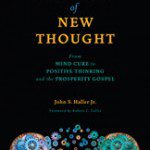 One of most spiritually significant and problematic aspects of New Thought and New Age philosophies involves its emphasis on the power of the mind and the role of thought in creating the circumstances of our lives. New Age teachers regularly proclaim that we create our own realities and that our life situation is a direct and unambiguous reflection of our thoughts.
One of most spiritually significant and problematic aspects of New Thought and New Age philosophies involves its emphasis on the power of the mind and the role of thought in creating the circumstances of our lives. New Age teachers regularly proclaim that we create our own realities and that our life situation is a direct and unambiguous reflection of our thoughts.
Some teachers, such as Louise Hay and the contributors to The Secret, assert that we are virtually 100% responsible for whatever happens to us – including our financial situation (an issue especially dear to the New Thought and New Age teachers), health, relationships, and joyful and traumatic events. They proclaim that there are no accidents in this world; one way or another, subtle or obvious, every event emerges as a reflection of our consciousness. As Rhonda Byrne, author of the best-selling book The Secret proclaims: “Everything that’s coming into your life you are attracting into your life. And it’s attracted to you by virtue of the images you’re holding in your mind. It’s what you’re thinking. Whatever is going on in your mind you are attracting to you.” The universe literally and directly responds to our thoughts. Wealth and success are the result of positive visualization and abundance thinking, while poverty is a condition of the spirit. We are poor because of negativity and fear. Abusive relationships are implicitly the result of our low self-esteem and feelings of unworthiness. Whereas a recent senatorial candidate asserted that if woman became pregnant after being raped, God intended it, these teachers suggest that your thoughts and feelings attracted rape and pregnancy into your life!
John Haller’s comprehensive and insightful text, A History of New Thought, describes the linear orientation of New Thought, New Age, and Christian prosperity thinking. Many New Age teachers claim that you can have everything you want from life, especially positive relationships and prosperity, if you just follow the right formulae. The universe reflects your state of mind. God wants you to prosper. Your positive thoughts and faith create wealth and poverty; your lack of faith and negative thinking issues in failure, disease, and poverty. In many ways, the various forms of New Thought spirituality have substituted an omnipotent mind and inexorable karma brought on by our thoughts and feelings for the omnipotent God of traditional Christianity. One vests all the power in our minds, the other in the Universal Will of God. Both are problematic and have potentially dangerous consequences for those who fail the tests of successful living and financial prosperity.
As a matter of full disclosure that I have found the affirmations of Unity, Attitudinal Healing, and A Course in Miracles helpful in my spiritual life. My text Holy Adventure: 41 Days of Audacious Living uses affirmations within a mainstream and progressive context as a way of opening us to greater experiences of insight, guidance, compassion, and alignment with God’s vision for our lives. I take seriously the Apostle Paul’s admonition, “Think about these things…,” as a call to transform our minds from fear to love, alienation to community, individualism to interdependence, and scarcity to abundance in an energetic, relational and God-filled universe. I believe that the use of affirmations can contribute to the realization Paul’s vision of the “transformed mind” and “the mind of Christ.” Affirmations can be a “tipping point” between health and illness, success and failure, and creativity and passivity. Our faith can contribute to our overall wholeness, as Jesus asserts in a number of the gospel healing stories. Nevertheless, I believe that in an interdependent universe our positive thinking and faith are limited and contextual in their impact on our lives. In an interdependent universe, our experience arises from an array of factors and not just our state of mind or spiritual focus. We do shape our world and can change our lives, but our initiatives and the extent of our friend is conditioned by causal factors partly beyond our control. (For more on Jesus’ healing stories, see my Healing Marks and God’s Touch: Faith, Wholeness, and the Healing Miracles of Jesus.)
There is freedom implied in the language of “you create your own reality” that may inspire personal transformation and commitment to new ways of thinking. I recognize that focusing on the power of the mind to transform reality can be a source of joy, but it can also be a source of guilt and pain. Moreover, in their identification of spiritual stature with prosperity, many New Age and New Thought philosophies encourage consumerism and individualism in a time in which our vocation is to aim at simplicity and relationship, personally and globally. For example, more than once I have heard people describe being told that their negativity led to the occurrence of cancer or heart disease or inability to receive an adequate salary. Others have been told that being laid off and unable to find work is a sign of lack of faith or negative imagery. Further, virtually none of these texts on the power of the mind focus on social responsibility or sacrifice for a greater good. When physical or economic misfortune strikes, no mention is made of the impact of the economy or the wisdom of institutional employment decision-making.
While New Thought and New Age teachers speak of the connection of our minds with the universal Mind, joining all of us, their understanding of the power of the mind is ultimately individualistic in nature. Our success and failure and wealth and poverty are entirely in our own hands. In contrast to this spiritual and materialistic individualism, I believe a more holistic vision would assert that “we create our realities” rather than “you create your reality” or “I create my reality.” Causation in the interdependent universe, described by physics and ecology, can be understood as dynamic and many-faceted. Karma is social as well as individual. Each moment of experience is a creative synthesis of many factors. My thoughts and emotions are important as one factor among many, not the only factor. Accordingly, prosperity and good health are not solely the result of my efforts but emerge in the context of a matrix of influences. We cannot take full credit for success or full responsibility for failure.
An interdependent understanding of the power of the mind addresses one of the greatest weaknesses of certain streams of New Thought and New Age philosophy – its radical individualism and sense of self-sufficiency. One of the glaring omissions of most New Age and New Thought philosophies is the absence of any concern for social justice or transformation. Like Adam Smith’s invisible hand that insures that unrestrained capitalism will benefit everyone, New Thought/New Age teachers believe that if everyone practices affirmative thinking or visualization, poverty and inequality will disappear of its own accord. If poverty remains, it is the result of negative thinking or scarcity consciousness. There is little sunlight between this position and the critique that “the poor are lazy.” Get your mind together and you will climb out of poverty and find the perfect job and relationship. If we help the vulnerable too much, some writers aver, we are interfering with their spiritual journey.
Those who affirm the power of the mind to shape reality should remember that issues of justice and Earth-care are neither incidental nor accidental to the soul’s journey. The mind is powerful, but its power is always contextual and a healthy mind recognizes its connectedness with all other minds – and bodies – in such that the well-being of one contributes to the well-being of all and the well-being of all contributes to the well-being of each one. New Thought and New Age thinking need their own transformation of mind, grounded in recognizing that we are all in this together and that the well-being of all is necessary for the well-being of each.
For more conversation on the history of New Thought and its impact on the American religious landscape, visit the Patheos Book Club.
 Bruce Epperly is a theologian, spiritual guide, pastor, and author of twenty two books, including Process Theology: A Guide to the Perplexed, Holy Adventure: 41 Days of Audacious Living, Philippians: An Interactive Bible Study, and The Center is Everywhere: Celtic Spirituality for the Postmodern Age. His most recent text is Emerging Process: Adventurous Theology for a Missional Church. He also writes regularly for the Process and Faith lectionary. He is currently serving as Visiting Professor of Process Studies at Claremont School of Theology and Claremont Lincoln University. His latest book is Healing Marks: Spirituality and Healing in Mark’s Gospel. He may be reached at [email protected] for lectures, workshops, and retreats.
Bruce Epperly is a theologian, spiritual guide, pastor, and author of twenty two books, including Process Theology: A Guide to the Perplexed, Holy Adventure: 41 Days of Audacious Living, Philippians: An Interactive Bible Study, and The Center is Everywhere: Celtic Spirituality for the Postmodern Age. His most recent text is Emerging Process: Adventurous Theology for a Missional Church. He also writes regularly for the Process and Faith lectionary. He is currently serving as Visiting Professor of Process Studies at Claremont School of Theology and Claremont Lincoln University. His latest book is Healing Marks: Spirituality and Healing in Mark’s Gospel. He may be reached at [email protected] for lectures, workshops, and retreats.













